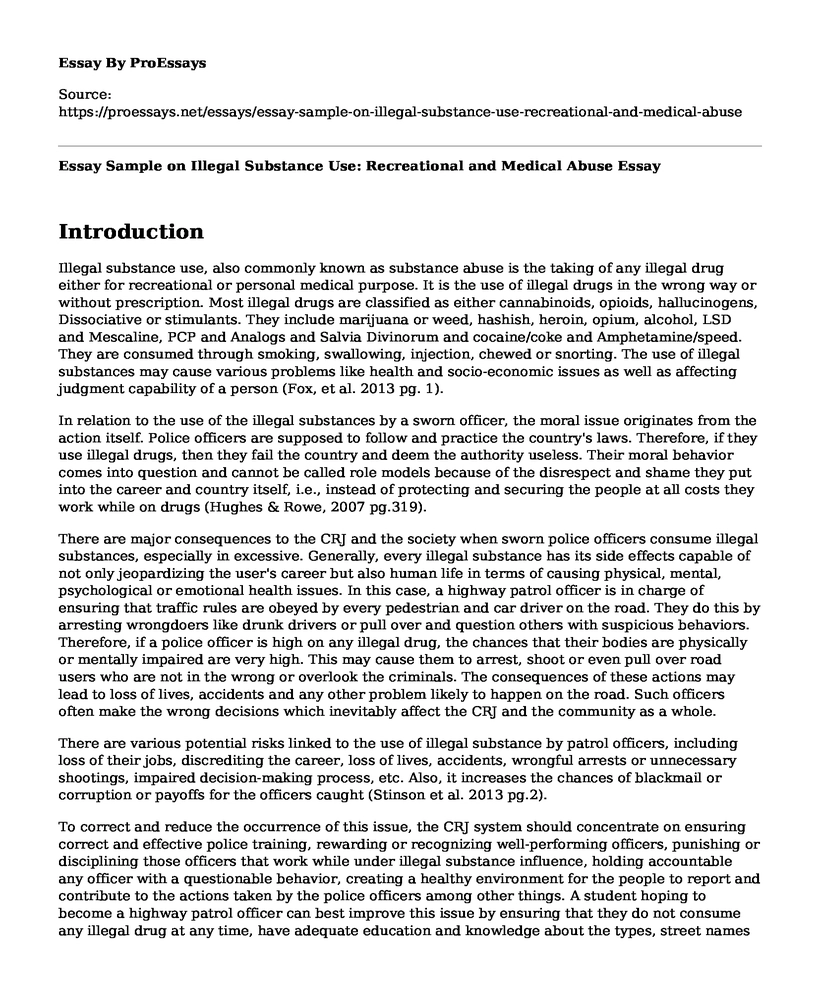Introduction
Illegal substance use, also commonly known as substance abuse is the taking of any illegal drug either for recreational or personal medical purpose. It is the use of illegal drugs in the wrong way or without prescription. Most illegal drugs are classified as either cannabinoids, opioids, hallucinogens, Dissociative or stimulants. They include marijuana or weed, hashish, heroin, opium, alcohol, LSD and Mescaline, PCP and Analogs and Salvia Divinorum and cocaine/coke and Amphetamine/speed. They are consumed through smoking, swallowing, injection, chewed or snorting. The use of illegal substances may cause various problems like health and socio-economic issues as well as affecting judgment capability of a person (Fox, et al. 2013 pg. 1).
In relation to the use of the illegal substances by a sworn officer, the moral issue originates from the action itself. Police officers are supposed to follow and practice the country's laws. Therefore, if they use illegal drugs, then they fail the country and deem the authority useless. Their moral behavior comes into question and cannot be called role models because of the disrespect and shame they put into the career and country itself, i.e., instead of protecting and securing the people at all costs they work while on drugs (Hughes & Rowe, 2007 pg.319).
There are major consequences to the CRJ and the society when sworn police officers consume illegal substances, especially in excessive. Generally, every illegal substance has its side effects capable of not only jeopardizing the user's career but also human life in terms of causing physical, mental, psychological or emotional health issues. In this case, a highway patrol officer is in charge of ensuring that traffic rules are obeyed by every pedestrian and car driver on the road. They do this by arresting wrongdoers like drunk drivers or pull over and question others with suspicious behaviors. Therefore, if a police officer is high on any illegal drug, the chances that their bodies are physically or mentally impaired are very high. This may cause them to arrest, shoot or even pull over road users who are not in the wrong or overlook the criminals. The consequences of these actions may lead to loss of lives, accidents and any other problem likely to happen on the road. Such officers often make the wrong decisions which inevitably affect the CRJ and the community as a whole.
There are various potential risks linked to the use of illegal substance by patrol officers, including loss of their jobs, discrediting the career, loss of lives, accidents, wrongful arrests or unnecessary shootings, impaired decision-making process, etc. Also, it increases the chances of blackmail or corruption or payoffs for the officers caught (Stinson et al. 2013 pg.2).
To correct and reduce the occurrence of this issue, the CRJ system should concentrate on ensuring correct and effective police training, rewarding or recognizing well-performing officers, punishing or disciplining those officers that work while under illegal substance influence, holding accountable any officer with a questionable behavior, creating a healthy environment for the people to report and contribute to the actions taken by the police officers among other things. A student hoping to become a highway patrol officer can best improve this issue by ensuring that they do not consume any illegal drug at any time, have adequate education and knowledge about the types, street names and effects of the substances and make sound decisions based on the law not personal, emotional or physical vendetta over the people. To be specific, the best way to address and solve the issue of illegal drug using by police officers is by punishing and holding accountable those that use while on duty. The reason is that they are more likely to make wrong decisions due to the impairment caused by the drugs hence possible shooting, wrongful arrests and other potential altercations that may occur on the road. However, by either arresting, forcing them to attend AA meetings, visit a counselor, give a leave without pay or suspension to name a few disciplinary choices, will enable other officers to conduct their work in a professional level and behavior.
References
Hughes, G., & Rowe, M. (2007). Neighborhood policing and community safety: Researching the instabilities of the local governance of crime, disorder and security in contemporary UK. Criminology & Criminal Justice, 7(4), 317-346. Retrieved from http://citeseerx.ist.psu.edu/viewdoc/download?doi=10.1.1.550.5967&rep=rep1&type=pdf
Fox, T. P., Oliver, G., & Ellis, S. M. (2013). The destructive capacity of drug abuse: an overview exploring the harmful potential of drug abuse both to the individual and to society. ISRN addiction, 2013. Retrieved from http://downloads.hindawi.com/journals/isrn.addiction/2013/450348.pdf
Stinson Sr, P. M., Liederbach, J., Brewer Jr, S. L., Schmalzried, H. D., Mathna, B. E., & Long, K. L. (2013). A study of drug-related police corruption arrests. Policing: An International Journal of Police Strategies & Management, 36(3), 1-41. Retrieved from http://scholarworks.bgsu.edu/cgi/viewcontent.cgi?article=1009&context=crim_just_pub
Cite this page
Essay Sample on Illegal Substance Use: Recreational and Medical Abuse. (2023, Jan 02). Retrieved from https://proessays.net/essays/essay-sample-on-illegal-substance-use-recreational-and-medical-abuse
If you are the original author of this essay and no longer wish to have it published on the ProEssays website, please click below to request its removal:
- Intersectionality and the Contribution of Women in Politics and in the Social Setting Essay
- Age Discrimination in Employment Act of 1967 Essay
- Fake News Discussion
- Intelligence Process in Immigration for Canada Paper Example
- Women Oppressed in Gilead Society: Roles of Women in the Handmaids Tale
- LGBTQ Youth: At Risk of Discrimination and Suicide - Research Paper
- Nursing Educator Redefines Thinking with Drug Awareness Plan - Essay Sample







